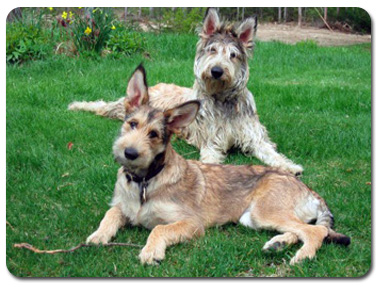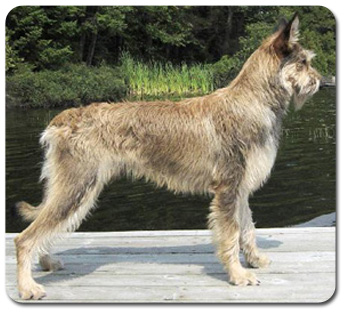
Berger Picard
Group: Herding Group
Origin: France
Height:
- – Males: between 23½ and 25½ inches;
– Females: between 21½ and 23½ inches
Also Known As: Picardy Shepherd; Picardy Sheepdog; Berger de Picardie
CLICK HERE to View Breeder Listings
Breed Profile
The Berger Picard is one of the oldest French breeds of sheep herding dogs. Some believe that the breed is related to the Briard and Beauceron, while others believe he shares a common ancestry with the Dutch Shepherd and Belgian Shepherd breeds. The two World Wars nearly caused the extinction of the Berger Picard and it is still rare, even in France.
The Berger Picard is a medium-sized, muscular dog, slightly longer than tall, with a distinctive rough coat and erect ears.
He is lively, alert, energetic, and affectionate. In France, he is still primarily used for herding. His intelligence and protective instincts make him suitable as a guard dog as well. He thrives on human companionship so makes an excellent family companion and is very good with children.
The Berger Picard has a distinctive shaggy, rough, double coat. The coat colour is either grey, grey-black, grey with black highlights, grey-blue, grey-red, light or dark fawn, or a mixture of these shades. There may also be white markings on the chest and tip of the toes.
Health Issues
If you are considering the adoption of a Picardy Shepherd puppy, or any breed, it is very important to be selective in choosing a responsible and reputable breeder. Ensure that the prospective puppy’s parents have all health clearances, this should include hip x-rays and eye testing. Breeding of any dog should not be done until after they have been proven to be free of evidence of significant hereditary diseases. (For more information on selecting a breeder, see the articles on the General Information page.)
Recommended Health Screening:
For the Berger Picard, the CHICNote 1 database includes health screenings for:
- Eye Examination by a board Ophthalmologist;
- Hip Dysplasia;
- DNA Repository;
- As well as one of the following health elective tests: OFA Cardic Evaluation; OFA Elbow Dysplasia Evaluation; OFA Thyroid Evaluation from an approved Labratory.
- Health and Nutrition — Growing section of the Canada’s Guide to Dogs website which includes information on several health and nutrition related issues.
- Canine Health Information Center (CHIC) — Providing a source of health information for owners, breeders, and scientists that will assist in breeding healthy dogs. CHIC is a centralized canine health database jointly sponsored by the AKC/Canine Health Foundation (AKC/CHF) and the Orthopedic Foundation for Animals (OFA).
- AKC Canine Health Foundation — Working towards developing scientific advances in canine health.
- OFA – Companion Animal Eye Registry (CAER)
- Orthopedic Foundation for Animals (OFA)
- Ontario Veterinary College (OVC)
- University of Pennsylvania Hip Improvement Program (PennHip)
- HealthGene — HealthGene Corporation is the leading provider of veterinary DNA diagnostic services in Canada.
- Labgenvet — Laboratory of Veterinary Genetics is a Canadian diagnostic laboratory that offers a comprehensive service of DNA tests for veterinary genetic diseases.
Grooming Information
- Grooming — This section of the Canada’s Guide to Dogs website includes tips, articles and information covering all aspects of dog grooming along with a listing of Groomers from across Canada.
Training Resources
- Training — For training information, see this growing section of the Canada’s Guide to Dogs website for tips, articles, as well as listings of training centres across Canada.
Additional Information
- Is a Dog from the Herding Group Right for You?
- Herding Dogs — The Herding Dogs section of the Canada’s Guide to Dogs website includes training and general information about Herding/Stock Dogs; listing of Stock Dog Clubs and Associations; listing of upcoming shows and events; and more.
- Clubs, Sports & Activities — For information on the many sports and activities you can get involved in with your dog.
- Working Dogs — The Working Dogs section of the Canada’s Guide to Dogs website provides information and listings of organizations that are involved in various dog jobs, such as Guide Dogs, Therapy Dogs, Police Dogs, Protection Dogs, and much more.

Deva des Mandarines Bleues and Ella Dee de la Vallée d’Ottawa
Photo courtesy of Elevage Noble Picard Kennel
*NOTE 1: CHIC – The Canine Health Information Center “is a database of consolidated health screening results from multiple sources. Co-sponsored by the Orthopedic Foundation for Animals (OFA) and the American Kennel Club (AKC) Canine Health Foundation, CHIC works with parent clubs to identify health screening protocols appropriate for individual breeds. Dogs tested in accordance with the parent club established requirements, that have their results registered and made available in the public domain are issued CHIC numbers.” To learn more, visit: www.caninehealthinfo.org
*NOTE 2: The Fédération Cynologique International (FCI) is the World Canine Organization, which includes 91 members and contract partners (one member per country) that each issue their own pedigrees and train their own judges. The FCI recognizes 344 breeds, with each being the “property” of a specific country. The “owner” countries write the standards of these breeds in co-operation with the Standards and Scientific Commissions of the FCI, and the translation and updating are carried out by the FCI. The FCI is not a breed registry nor does it issue pedigrees.
Breed Listing
Quick Links
Get In Touch
- Email: canadasguidetodogs@gmail.com
- Email: info@canadasguidetodogs.com
- Visit us on Facebook: www.facebook.com/CanadasGuideToDogs
— CanadasGuideToDogs.com is an Amazon Associate as well as a participant in various affiliate programs, as such fees are earned from qualifying purchases.



